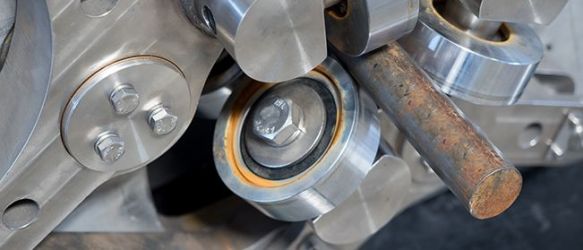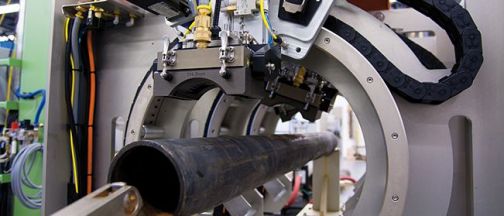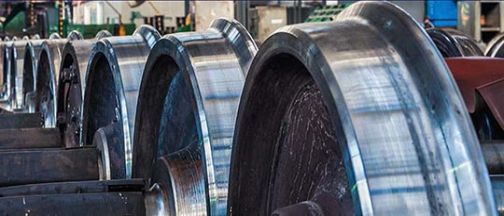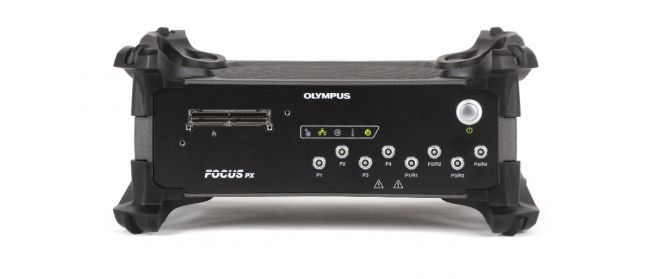Automated Inspection Systems
Olympus designs and delivers automated inspection systems that meet the most challenging needs.
Our systems utilize phased array and eddy current array to inspect the full volume and surface of various products and profiles in many manufacturing industries, such as metal, aerospace, transportation, power generation, and oil & gas.
We introduced inspection systems with ultrasonic phased array technology in the early 2000s and have since delivered more than 100 systems worldwide.
Benefits of Olympus automated inspection systems:
- All fields of expertise coordinated under the same roof
- Exceptional quality from a recognized brand
- Durable, scalable, and reliable solutions
- Ease of operation with minimum operator skill dependency
- High throughput
Ultrasonic Flaw Detectors
Our range of digital thickness gauge solutions includes basic handheld thickness gauges, advanced ultrasonic gauges, and single and dual element transducers./span

Bar Inspection Solutions
Bar inspection system using ultrasonic phased array, eddy current array, and X-ray fluorescence spectroscopy technologies.

Tube Inspection Solutions
Seamless and welded tube inspection system using ultrasonic phased array and X-ray fluorescence spectroscopy technologies.

Wheel Inspection Solutions
The Wheel Inspection System’s phased array probes inspect the rim,
from the tread and one face, in addition to the hub from both sides in
less than one minute.

Systems Instrumentation
Olympus industrial instruments include high-performance acquisition units that are used in our integrated inspection systems as well as by third-party integrators all over the world.

Friction Stir Weld (FSW) Solutions
The friction stir weld (FSW) inspection system incorporates unique
robotics and ultrasonic phased array technology to reliably detect FSW
defects at multiple orientations.
Olympus Systems Resource Videos
What is a thickness gauge?
A thickness gauge is a device used to quickly and easily measure the thickness of a material. A thickness gauge is useful for many industries but is most commonly used in engineering and manufacturing to help ensure material thickness complies with industrial standards and regulations. As well as measuring the thickness and density of a material, a thickness gauge can be used as an additional quality assurance tool in industries such as automotive manufacturing to measure the uniformity of the material and help identify hidden damages or imperfections.
How much does a thickness gauge cost?
Different factors can affect the price and cost of a thickness gauge, such as the transducer frequency, thickness measurement application, and software capabilities. We offer free quotes and demos so that you can test and evaluate gauges pre-purchase; contact us to learn more.
What is a Hall-effect thickness gauge?
Hall-effect thickness gauges, such as the Magna-Mike™ 8600 gauge, use a sensor that responds to changes in a magnetic field by varying a voltage. Using a small magnetic target, they can accurately measure the thickness of nearly any non-magnetic material where a probe can be placed on one side and a target, like a steel ball, on the other. Hall-effect gauges are also called magnetic gauges.
How do you measure pipe thickness?
If you’re looking to measure the thickness of a pipe, an ultrasonic thickness gauge should be used. A handheld thickness gauge, such as the 27MG gauge, will offer accurate measurements from one side of metal pipes and parts that are thinning due to erosion or corrosion.
How do you measure metal thickness?
To accurately measure the thickness of a metal without damaging it, an ultrasonic thickness gauge should be used.
What is mil thickness?
A mil (or thou) is a unit of thickness that equals one thousandth of an inch (0.001 inches). Example: 10 mils = 0.010 inches. Mil thickness is commonly used in manufacturing in non-metric countries to measure the thickness of various thin materials, such as paint layers, thin films, foils, plastic sheets, and coatings.
What is micron thickness?
A micron (µm) is a small unit of thickness that equals one-millionth of a meter (0.000001 meters) and one-thousandth of a millimeter (0.001 millimeters). Micron is the shortened word for micrometer and is the closest metric unit to a mil (25.4 microns = 1 mil).
How do you check paint thickness?
Ultrasonic thickness gauges can measure paint thickness nondestructively. For example, high-frequency thickness gauges such as the 72DL PLUS instrument offer features that can calculate total paint thickness and simultaneously display paint thickness measurements of up to six individual layers. Paint thickness is expressed in mils or microns.
How do you measure plastic thickness?
To measure the thickness of plastic nondestructively, a Hall-effect or ultrasonic thickness gauge should be used. The thickness of plastic is often expressed in mils or microns.
Ultrasonic Flaw Detectors Videos
Introduction to the 38-Link™ Wireless Communication Tool for the 38DL PLUS Ultrasonic Thickness Gauge
The 38-Link adapter enables any existing 38DL PLUS gauge to send and receive data using a Bluetooth® or wireless LAN connection, enabling more efficient workflows.
Introduction to the 38-Link™ Wireless Communication Tool for the 38DL PLUS Ultrasonic Thickness Gauge
The 38-Link adapter enables any existing 38DL PLUS gauge to send and receive data using a Bluetooth® or wireless LAN connection, enabling more efficient workflows.
Introduction to the 38-Link™ Wireless Communication Tool for the 38DL PLUS Ultrasonic Thickness Gauge
The 38-Link adapter enables any existing 38DL PLUS gauge to send and receive data using a Bluetooth® or wireless LAN connection, enabling more efficient workflows.

